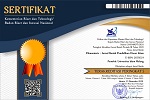RESPON SISWA TERHADAP PENGGUNAAN MODUL TEMATIK DALAM MENINGKATKAN KEMAMPUAN BERPIKIR KRITIS
DOI:
https://doi.org/10.33474/elementeris.v2i1.4903Abstract
This research aimed to determine students' responses to the use of thematic modules based on the integration of Islam and science in improving critical thinking skills on energy themes and their changes in 3rd grade MI Salafiyah Kutukan Blora. The research method apply in this research is descriptive research. The Descriptive research used in this research is the survey. The research instrument used was a student response questionnaire. Analysis of student response questionnaires showed that 80,3% of students stated that using thematic modules could improve students' critical thinking skillsReferences
Anam. (2016). Pembelajaran Berbasis Inkuiri Metode dan Aplikasi. Yogyakarta: Pustaka Pelajar.
Asfiah, N., Mosik, & Purwantoyo, E. (2013). Pengembangan Modul IPA Terpadu Konstektual Pada Tema Bunyi. Unnes Science Education Journal, 2(1), 188–195.
Filsaime, D. K. (2008). Menguak Rahasia Berpikir Kritis Dan Kreatif. Jakarta: PRestasi pustakaraya.
Fisher, A. (2008). Berpikir Kritis Sebuah Pengantar. Jakarta: Erlangga.
Hidayati, N. dan M. H. N. (2013). Respon Guru dan Siswa Terhadap Pembelajaran Permainan Bolavoli yang Dilakukan dengan Pendekatan Modifikasi (pada Siswa Kelas V SDN Wateswinagun I Sambeng- Lamongan). Jurnal Pendidikan Olahraga Dan Kesehatan, 1(1), 104–106.
Huda, M. (2014). Model-model Pengajaran dan Pembelajaran: Isu-isu Metodis dan Paradigmatis. Yogyakarta: Pustaka Pelajar.
Mahanal, S. (2007). Penerapan Pembelajaran Berdasarkan Masalah dengan Strategi Kooperatif Model STAD pada Mata Pelajaran Sains untuk Meningkatkan Kemampuan Berpikir Kritis. Jurnal Penelitian Kependidikan.
Men, F. E. (2017). Proses Berpikir Kritis Siswa SMA dalam Pengajuan Soal Matematika Berdasarkan Tingkat Kemampuan Matematika. Jurnal Matematika Kreatif-Inovatif, 8(2), 191–198.
Muh Tawil, L. (2013). Berpikir Kompleks dan Implementasinya dalam Pembelajaran IPA. Makasar: Badan Penerbit Universitas Negeri Makassar.
Padmapriya, P. V. (2015). Effectiveness of Self Learning Modules on Achievement in Biology Among Secondary School Students. International Journal of Education and Psychological Research, 4(2), 44–46.
Riduwan. (2013). Belajar Mudah Penelitian untuk Guru-Karyawan dan Peneliti Pemula. Bandung: Alfabeta.
Saglam, H. I. (2011). An Investigation on Teaching Material used in Social Studies Lesson. The Turkish Online Journal of Educational Technology, 1(10).
Sari, D. puspita. (2017). Respon siswa terhadap modul system eksresi manusia pada pembelajaran biologi kelas XI SMA. universitas tanjungpura.
Sujiono & Widiyatmoko, A. (2014). Pengembangan Modul IPA Terpadu Berbasis Problem Based Learning Tema Gerak untuk Meningkatkan Kemampuan Berpikir Kritis Siswa. Unnes Science Education Journal, 3(3), 685–693.
Syahroni, M.W., Dewi, N. R., K. (2016). The Effect of Using DIGIMON (Science Digital Module) With Scientific Approach at the Visualization of Students’ Independence and Learning Results. Jurnal Pendidikan IPA Indonesia, 5(1), 116–122.
Wena, M. (2009). Strategi Pembelajaran Inovatif Kontemporer. Jakarta: Bumi aksara.
Windarti. (2015). Pengembangan Modul Pembelajaran Logika yang Memuat Pendidikan Karakter untuk Siswa Kelas X SMK. Jurnal Pendidikan Matematika, 10(1), 106–116.
Downloads
Published
Issue
Section
License
The journal operates an Open Access policy under a Creative Commons Non-Commercial 4.0 International license. Authors who publish with this journal agree to the following terms:
- Authors retain copyright and grant the journal right of first publication with the work simultaneously licensed under a Commons Attribution-NonCommercial 4.0 International License
that allows others to share — copy and redistribute the material in any medium or format, and adapt — remix, transform, and build upon the material.
- Authors are able to enter into separate, additional contractual arrangements for the non-exclusive distribution of the journal's published version of the work (e.g., post it to an institutional repository or publish it in a book), with an acknowledgement of its initial publication in this journal.
- Authors are permitted and encouraged to post their work online (e.g., in institutional repositories or on their website) prior to and during the submission process, as it can lead to productive exchanges, as well as earlier and greater citation of published work.
Elementeris: Jurnal Ilmiah Pendidikan Dasar Islam by Universitas Islam Malang is licensed under a Creative Commons Attribution-NonCommercial 4.0 International License.
Based on a work at http://riset.unisma.ac.id/index.php/je/index.















